The Mooncake Festival, also known as the Mid-Autumn Festival, is one of the most celebrated and cherished festivals in China. It is a time of family reunions, worship of the moon, and the sharing of mooncakes, which are symbolic treats representing harmony and unity. This festival is steeped in tradition, with stories and legends passed down through generations, the most famous of which is the tale of Hou Yi and Chang’e, a story of love, sacrifice, and immortality. In the heart of ancient China, where mystical forces intertwined with the fates of mortals, this legend begins. Long ago, the earth was a place of harmony and prosperity, a land where nature flourished under the benevolent rule of the Jade Emperor. The heavens were calm, and mortals lived peaceful lives, nurtured by the light of the sun. However, not one, but ten suns ruled the sky, rising alternately each day to provide warmth and sustenance. These suns were not merely celestial bodies but were brothers—ten divine beings who took turns riding their fiery chariots across the heavens. For centuries, this rotation continued without disruption. The world blossomed under the steady, life-giving glow of the suns. However, one fateful day, the ten brothers grew bored of their routine. They longed for adventure, a break from their monotonous duty. Ignoring the warnings of their father, the Jade Emperor, they decided to rise into the sky together, all at once. Their combined heat and brightness scorched the earth. Rivers dried up, crops withered, and the people suffered under the unbearable heat. If something wasn’t done soon, the world would perish. Amid the chaos, a hero emerged. His name was Hou Yi, a master archer renowned for his skill and bravery. Hou Yi was no ordinary man; he was a demigod, born of both mortal and divine heritage, and his strength was unparalleled. Seeing the devastation caused by the ten suns, Hou Yi knew that he had to act. Armed with his magical red bow and white arrows gifted by the Queen Mother of the West, he ascended the tallest peak in China, Mount Kunlun, and took aim at the blazing sky. One by one, Hou Yi shot down nine of the ten suns. Each arrow found its mark, and the suns plummeted from the sky, extinguishing their blinding flames as they fell. The last remaining sun, terrified, hid behind the mountains. The earth began to cool, and life slowly returned to normal. The rivers flowed again, crops grew once more, and the people rejoiced. Hou Yi was hailed as a hero, praised for saving the world from certain destruction. However, his act had consequences far beyond what anyone could foresee. The Jade Emperor was furious with Hou Yi. Although his sons had caused destruction, they were still his children, and Hou Yi’s act of killing nine of them was seen as an offense against heaven. As punishment, the Jade Emperor stripped Hou Yi of his divinity, casting him and his wife, Chang’e, into the mortal world. Despite his demotion, Hou Yi continued to serve as a hero among mortals, using his skills as an archer to protect the people from dangerous beasts and natural disasters. His love for Chang’e was deep, and they lived happily together, despite the trials they faced. One day, as Hou Yi was traveling across distant lands, he came upon the Queen Mother of the West once more. Moved by his heroism and love for his wife, she gifted him a rare and powerful elixir, a potion that could grant immortality. However, the elixir came with a heavy condition: it was so potent that only half the potion was needed to ascend to the heavens and become immortal. If both he and Chang’e were to drink it, they would need to share the dose. Hou Yi took the elixir home, intending to share it with his beloved Chang’e so they could live together forever. However, despite his great love for her, Hou Yi hesitated. He didn’t want to leave the mortal world behind, where he had made such a difference. He decided to store the elixir in a hidden place in their home until they could decide together when to take it. Among Hou Yi’s many apprentices was a man named Peng Meng, a deceitful and power-hungry individual. When Peng Meng learned of the elixir of immortality, he began to plot. He knew that if he could get his hands on the potion, he could drink it and ascend to the heavens himself, leaving behind the suffering and mortality of the human world. One day, when Hou Yi was away on a hunting trip, Peng Meng saw his opportunity. He broke into Hou Yi’s home and confronted Chang’e, demanding that she hand over the elixir. Knowing that she could not defeat him in combat and unwilling to give the potion to such a wicked man, Chang’e made a desperate decision. She swallowed the entire elixir herself. Immediately, she felt her body become weightless, and she began to rise into the sky, ascending towards the heavens. Peng Meng could only watch in astonishment as Chang’e floated higher and higher, disappearing into the night sky. Her love for Hou Yi tethered her soul to the moon, the closest celestial body to the earth, and there she took refuge. As the goddess of the moon, she watched over the world from afar, her heart longing for her husband. When Hou Yi returned home and learned what had happened, he was heartbroken. He looked up at the moon each night, hoping to catch a glimpse of his beloved Chang’e. He prayed to the moon, offering her favorite foods—sweet cakes and fruits—as tokens of his love and devotion. The people, who had admired Hou Yi and Chang’e, began to follow his lead, offering mooncakes and lighting lanterns in their honor during the full moon. Every year, during the Mid-Autumn Festival, families gather to celebrate the reunion of loved ones, just as Hou Yi hoped to be reunited with Chang’e. It is said that on this night, the moon shines brightest, and if one looks closely enough, they might see the figure of a woman—the immortal Chang’e—dancing gracefully on its surface. Her story is a reminder of the eternal bond between those who love each other, even if separated by great distances. The moon, round and full, symbolizes completeness and unity. For the people of China, the Mid-Autumn Festival is a time to come together with family, to enjoy mooncakes, and to reflect on the legend of Hou Yi and Chang’e, whose love transcended even the boundaries of life and death. As the legend of Hou Yi and Chang’e spread throughout China, more stories began to emerge about what else might live on the moon alongside the goddess. One of the most enduring tales is that of the Jade Rabbit. According to legend, the Jade Rabbit was a selfless creature who lived in the forests of ancient China. One day, the Emperor of Heaven disguised himself as an old beggar and descended to earth to test the kindness of the animals. He asked each of them for food. The monkey brought him fruit, the fox offered fish, and the rabbit, with nothing to give, threw himself into the fire so that the beggar could eat his flesh. Moved by the rabbit’s sacrifice, the Emperor of Heaven revealed his true form and saved the rabbit from the flames. He rewarded the rabbit by sending him to live on the moon with Chang’e, where he became her companion. It is said that the Jade Rabbit can be seen pounding herbs with a mortar and pestle, creating the elixir of immortality for Chang’e to one day share with Hou Yi when they are reunited. Even today, if you look closely at the full moon, you may see the outline of a rabbit, diligently working alongside the goddess Chang’e, a symbol of selflessness, loyalty, and love. As the centuries passed, the Mid-Autumn Festival continued to evolve. The people began lighting lanterns and setting them afloat on rivers, symbolizing their hopes and dreams being carried to the heavens. These lanterns represented the desire for good fortune, happiness, and the reunion of family members who had been separated by time or distance. Each year, the festival became more vibrant, with parades, dances, and music filling the streets. Mooncakes, once a humble offering to Chang’e, became more elaborate, filled with sweet lotus paste, salted egg yolk, and other rich ingredients, symbolizing the completeness of the family unit. The festival was not just a celebration of the legend but a time for people to come together, to appreciate the beauty of the moon, and to honor the values of family, loyalty, and love. Though the story of Hou Yi and Chang’e remains at the heart of the festival, the Mid-Autumn Festival is ultimately a celebration of human connection. It is a time for reflecting on the bonds that unite us, the sacrifices we make for one another, and the hope that even in separation, love endures. Today, the Mooncake Festival, or Mid-Autumn Festival, is celebrated not only in China but across many East Asian countries, including Vietnam, Singapore, and Malaysia. Families gather together to eat mooncakes, light lanterns, and appreciate the beauty of the full moon. The festival has become a blend of ancient tradition and modern celebration, a time for reflection, gratitude, and connection. In bustling cities and quiet villages alike, people pause to look up at the moon, remembering the legend of Hou Yi and Chang’e. The moon, a constant in the night sky, serves as a reminder that even when separated, we are all connected under its light. The legend of the Mooncake Festival continues to inspire, reminding us that love, sacrifice, and reunion are universal themes that transcend time and culture. As we gather with loved ones under the full moon, we carry forward the stories of those who came before us, passing on the rich tradition of the Mid-Autumn Festival to future generations.The Land Under the Ten Suns
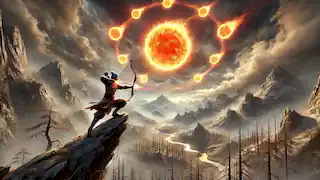
The Gift of Immortality
The Betrayal of Peng Meng
The Reunion on the Moon
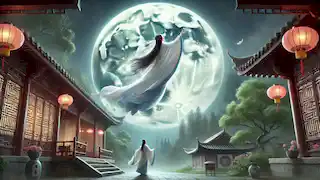
The Rabbit on the Moon
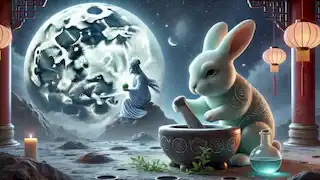
The Lanterns of Hope
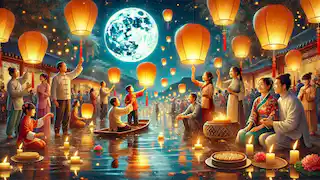
A Modern Celebration
The Legend of the Mooncake Festival
Reading Time: 9 min
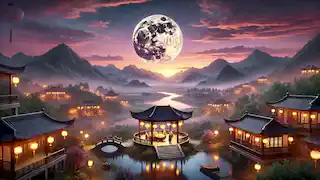
About Story: The Legend of the Mooncake Festival is a Legend Stories from china set in the Ancient Stories. This Descriptive Stories tale explores themes of Romance Stories and is suitable for All Ages Stories. It offers Cultural Stories insights. A legendary tale of love, sacrifice, and immortality under the moon's glow.


















